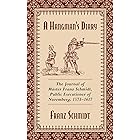| Digital List Price: | $19.99 |
| Kindle Price: | $14.99 Save $5.00 (25%) |
| Sold by: | Amazon.com Services LLC |
Your Memberships & Subscriptions

Download the free Kindle app and start reading Kindle books instantly on your smartphone, tablet, or computer - no Kindle device required.
Read instantly on your browser with Kindle for Web.
Using your mobile phone camera - scan the code below and download the Kindle app.

OK
 Audible sample Sample
Audible sample Sample 


The Faithful Executioner: Life and Death, Honor and Shame in the Turbulent Sixteenth Century Kindle Edition
THE EXTRAORDINARY STORY OF A RENAISSANCE-ERA EXECUTIONER AND HIS WORLD, BASED ON A RARE AND OVERLOOKED JOURNAL.
In a dusty German bookshop, the noted historian Joel F. Harrington stumbled upon a remarkable document: the journal of a sixteenth-century executioner. The journal gave an account of the 394 people Meister Frantz Schmidt executed, and the hundreds more he tortured, flogged, or disfigured for more than forty-five years in the city of Nuremberg. But the portrait of Schmidt that gradually emerged was not that of a monster. Could a man who practiced such cruelty also be insightful, compassionate—even progressive?
In The Faithful Executioner, Harrington teases out the hidden meanings and drama of Schmidt's journal. Deemed an official outcast, Meister Frantz sought to prove himself worthy of honor and free his children from the stigma of his profession. Harrington uncovers details of Schmidt's life and work: the shocking, but often familiar, crimes of the day; the medical practice that he felt was his true calling; and his lifelong struggle to reconcile his craft with his religious faith.
In this groundbreaking and intimate portrait, Harrington shows us that our thinking about justice and punishment, and our sense of our own humanity, are not so remote from the world of The Faithful Executioner.
- LanguageEnglish
- PublisherFarrar, Straus and Giroux
- Publication dateMarch 19, 2013
- File size8234 KB
Customers who bought this item also bought
Editorial Reviews
From Booklist
Review
“Fascinating . . . Engrossing . . . Harrington brings out the sheer strangeness of the past . . . In The Faithful Executioner, Mr. Harrington has not only rescued the life of an individual from disgust and condescension but also, by focusing on a career in killing, brought a whole world back to life.” ―The Wall Street Journal
“Remarkable . . . [A] fascinating exploration . . . this is a surprisingly modern, even topical story that poses difficult questions about capital punishment and what Harrington calls ‘the human drive toward retribution.'” ―The Washington Post
“Fascinating . . . One of the pleasures of reading history is to be transported somewhere, even if we aren't sure we want to go.” ―The Chronicle of Higher Education
“Equal parts enlightening and enjoyable.” ―The Daily Beast
“[A] vividly drawn portrait . . . Harrington succeeds in deftly taking us beyond Schmidt's biography to address broader questions. Finely researched and crafted.” ―History Today
“A fascinating read.” ―Publishers Weekly
“Surprisingly poignant . . . A whole teeming world of Reformation Germany comes alive.” ―Kirkus Reviews
“This is a precious story that Harrington has drawn from the journal and archival records, a braiding of Schmidt's words with a re-creation of Schmidt's world, a story that is at once inclusive and atmospheric, deeply intimate and rare . . . It is a wonder-making world, made manifest by an artful historian's hand.” ―Barnes & Noble Review
“Who can imagine how an executioner feels about his trade? Joel F. Harrington has written a considered and fascinating book that helps us hear the voice of one such man, a professional torturer (and healer) who, astonishingly, kept a diary. Exploring both sixteenth-century Nuremberg and the world about the city, he re-creates the social context for the flamboyant displays of cruelty that later centuries find so hard to comprehend. Both the executioner and his victims are rescued from our condescension and restored to their own moral universe―which is not as far from ours as we like to suppose.” ―Hilary Mantel, Man Booker Prize–winning author Wolf Hall and Bring Up the Bodies
“A book as entertaining and revealing as it is improbable and outrageous. Joel F. Harrington has told a marvelous yarn, giving us not just the compelling biography of Meister Frantz but his world.” ―Rick Atkinson, Pulitzer Prize–winning author of The Day of Battle: The War in Sicily and Italy, 1943–1944
“In an astonishing feat of historical reconstruction, Joel F. Harrington uniquely draws us into the emotional world of a man paid to kill professionally--into his troubled sense of achievement and shame. This compelling book is brilliant reading for everyone interested in new ways of thinking about the past as well as crime and punishment today.” ―Ulinka Rublack, author of Dressing Up: Cultural Identity in Renaissance Europe
“The Faithful Executioner masterfully conjures the heavy stench and bustle of a sixteenth-century southern German city--waterlogged roads, smoky marketplaces, blood-lusty masses laden with bizarre superstitions--via the Lebenslauf of a curious figure: Meister Frantz Schmidt, Nuremburg's state executioner from 1578 to 1617. With the help of Schmidt's private journal, Joel F. Harrington revivifies both the detailed and the abstract with enviable scholarship and style. This is social history at its very best: weird, riveting, addictive.” ―R. Jay Magill Jr., author of Sincerity
About the Author
Joel F. Harrington is a professor of history at Vanderbilt University. He is the author of The Unwanted Child, winner of the 2010 Roland H. Bainton Prize for History, as well as Reordering Marriage and Society in Reformation Germany and A Cloud of Witnesses. He lives with his wife and two children in Nashville, Tennessee.
Product details
- ASIN : B0096MTBO4
- Publisher : Farrar, Straus and Giroux (March 19, 2013)
- Publication date : March 19, 2013
- Language : English
- File size : 8234 KB
- Text-to-Speech : Enabled
- Screen Reader : Supported
- Enhanced typesetting : Enabled
- X-Ray : Enabled
- Word Wise : Enabled
- Sticky notes : On Kindle Scribe
- Print length : 316 pages
- Best Sellers Rank: #170,996 in Kindle Store (See Top 100 in Kindle Store)
- #5 in 16th Century World History
- #17 in Penology (Kindle Store)
- #93 in History of Germany
- Customer Reviews:
About the author

Joel F. Harrington has published seven books on the religious and social history of pre-modern Germany. His most recent work is Dangerous Mystic, an account of the life and times of Meister Eckhart. Previous publications include The Faithful Executioner, which has been translated into fourteen languages, and The Unwanted Child, winner of the Roland H. Bainton prize in History. He is currently Centennial Professor of History at Vanderbilt University, where he teaches classes ranging from the Historical Jesus to Religion and Magic in Early Modern Europe. He lives in Nashville.
Customer reviews
Customer Reviews, including Product Star Ratings help customers to learn more about the product and decide whether it is the right product for them.
To calculate the overall star rating and percentage breakdown by star, we don’t use a simple average. Instead, our system considers things like how recent a review is and if the reviewer bought the item on Amazon. It also analyzed reviews to verify trustworthiness.
Learn more how customers reviews work on Amazon-
Top reviews
Top reviews from the United States
There was a problem filtering reviews right now. Please try again later.
The story is more surprising than you think. A wonderfully researched and written book that explores the life and times of the 16th century. An interesting look into what it took personally and morally to play the role of the most hated man in town.
Schmidt's achievement of a reputation for moderate conduct and piety is postured as his near heroic attempt to redeem his family's reputation (lost when an ancestor was "drafted" to become an executioner, a profession of low regard, with such professionals and their families essentially shunned by mainstream society). So despite the beheadings, breaking at the wheels, and floggings there is a moral and happy ending of sorts to the tale. His personal life journey and that of his family is noteworthy.
The detailed story serves as a clear counter-weight to the idealized Nürnberg of Wagner and other Romantics. It was a violent and perilous world, not the happy and conciliatory playground of Hans Sachs and Walter von Stolzing. Of course it comes as no surprise that Wagner, albeit a talented composer, idealized much of what mattered to him. This book is a reminder of how large the gap between reality and his idealization was.
There was a pay-off for me as there is a direct reference to the intersection of Schmidt's life and the Meistersingers Guild, which effectively reinforces the humanity that the executioner is able to maintain while performing his brutal duties.
A four star rating is conditioned upon a very personal compelling interest in the subject, without which it is entirely foreseeable that many readers would end up "speed reading" or scanning the last third (which gets repetitive) in order to get to the Epilogue (I was sorely tempted). Occasionally, less is more.
Top reviews from other countries
i am a student of history, somewhat, so i am always on the look-out for a new insight into any period of history i'm interested in - and BOY does this give you an insight into Baroque-era Germany.
Author Harrington really seems to have a good grasp of the ground-level aspects of early-modern German society, & gives quite an informed and insightful outline of both the period as a whole (as it relates to Germany), & presentation of Schmidt himself - a rare and colourful character, unmatched, as we find out, in the whole history of executioners.
This is, without doubt, one of the most rewarding books i have read in recent years, and i cannot recommend it enough!










